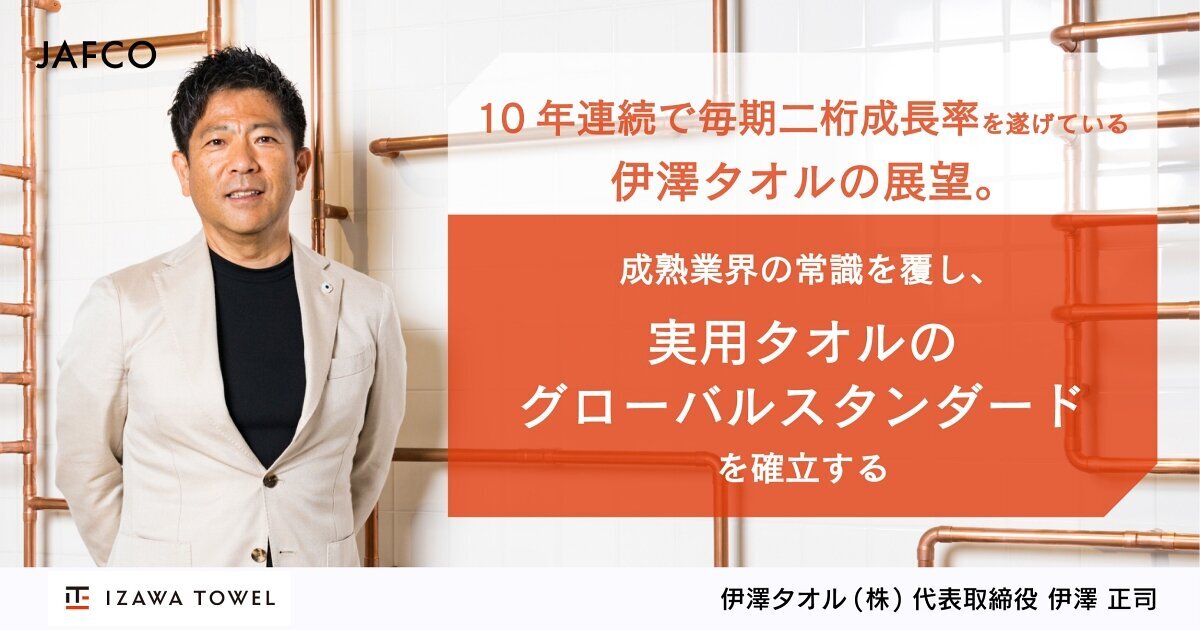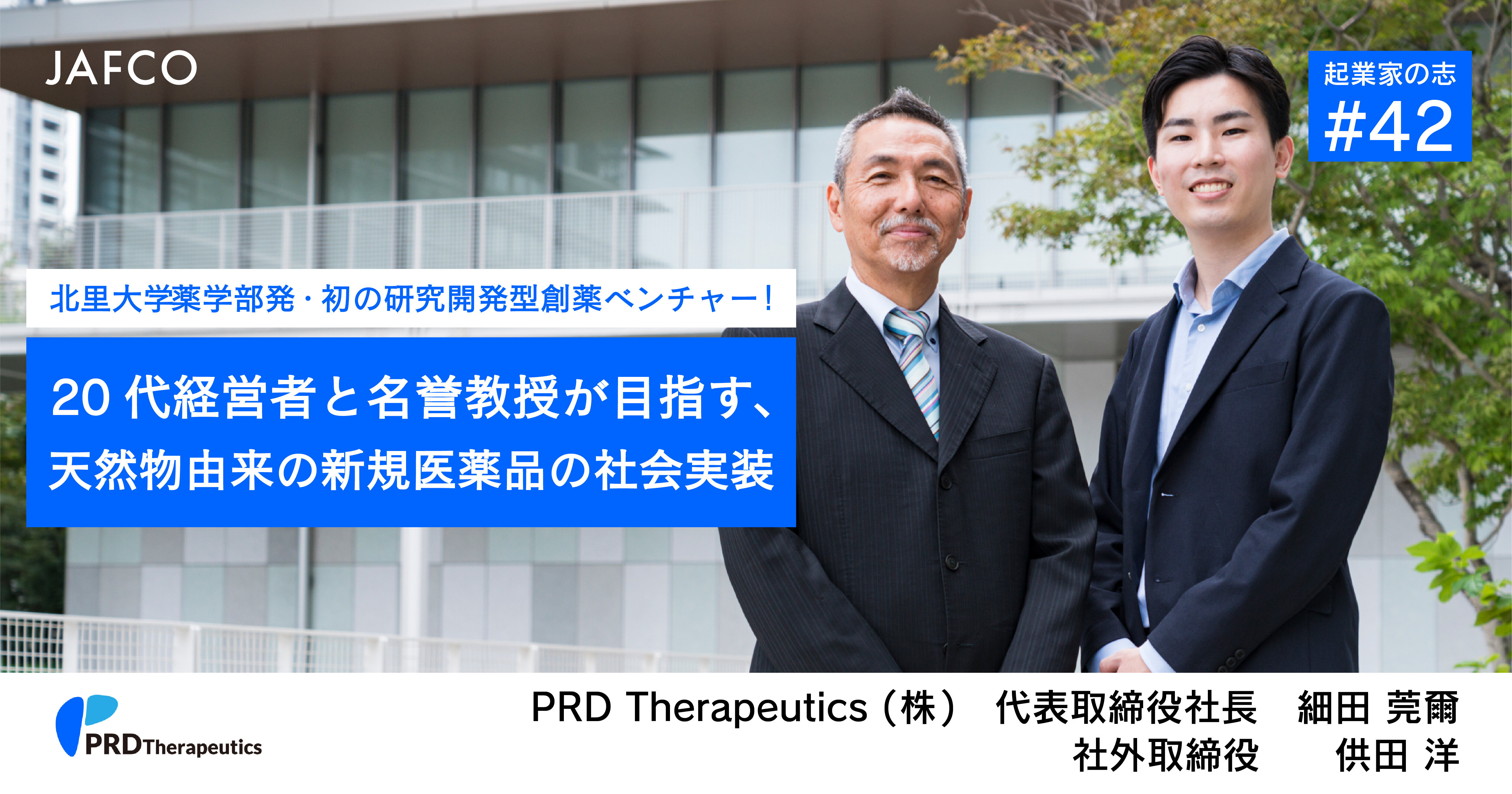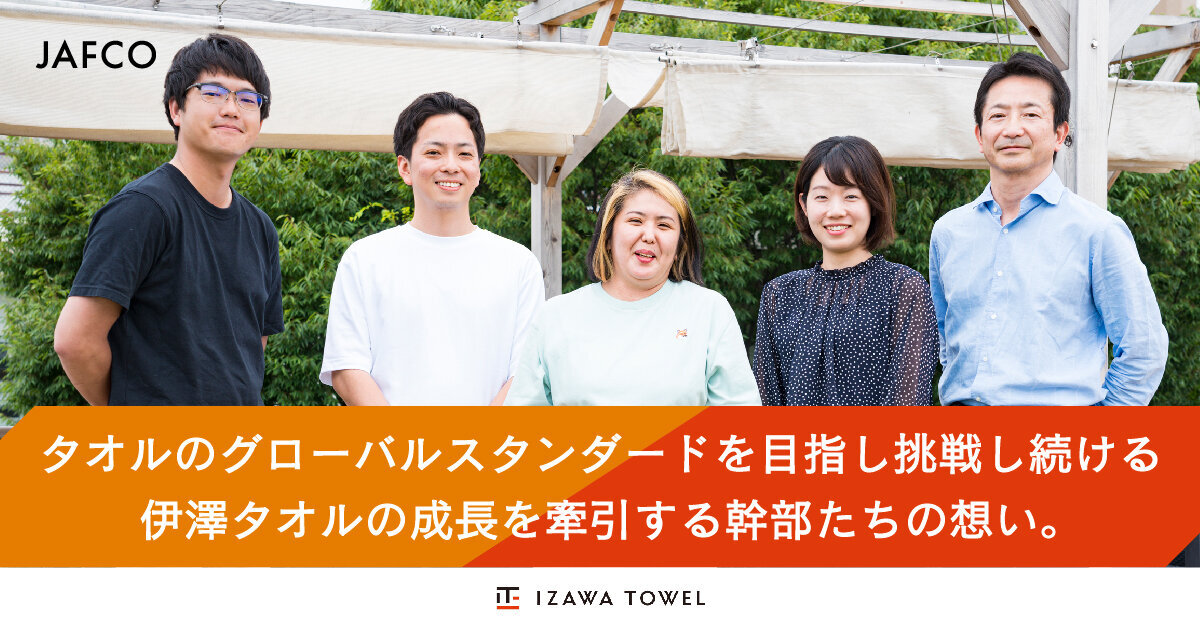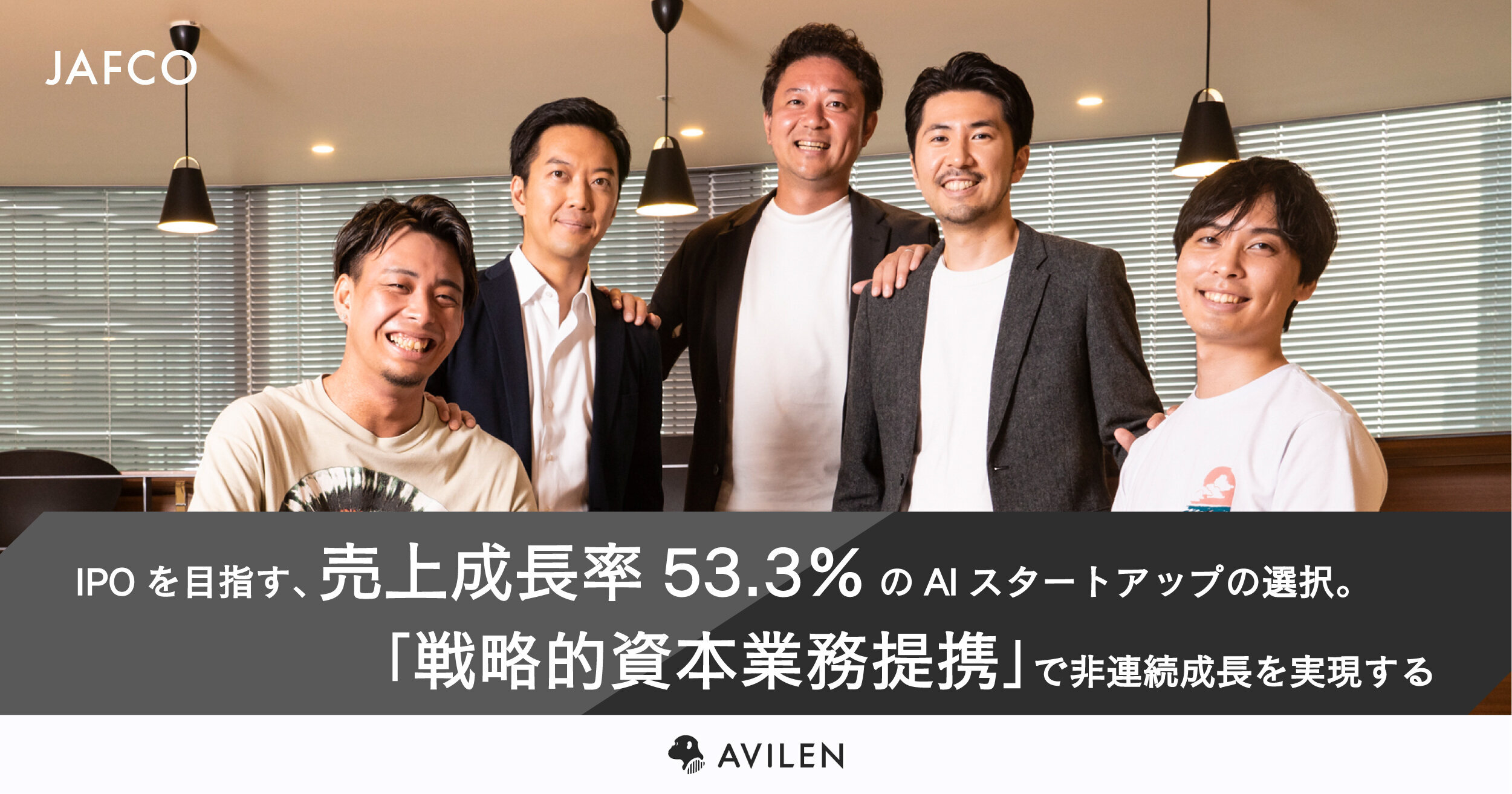Founded in 1970, Izawa Towel Co., Ltd. has expanded its market share through ODM (original design manufacturing) for major retailers and e-commerce sites. The company has achieved double-digit sales growth for 10 consecutive years through ideas that defy industry conventions, including an SPA-type business model specializing in practical towels, the establishment of an R&D department unique among Japanese towel manufacturers, and a business strategy with a view to global expansion. The company is also considering an IPO in the future.
We interviewed the company's President, Shoji Izawa, about its growth strategy aimed at establishing the global standard for towels.
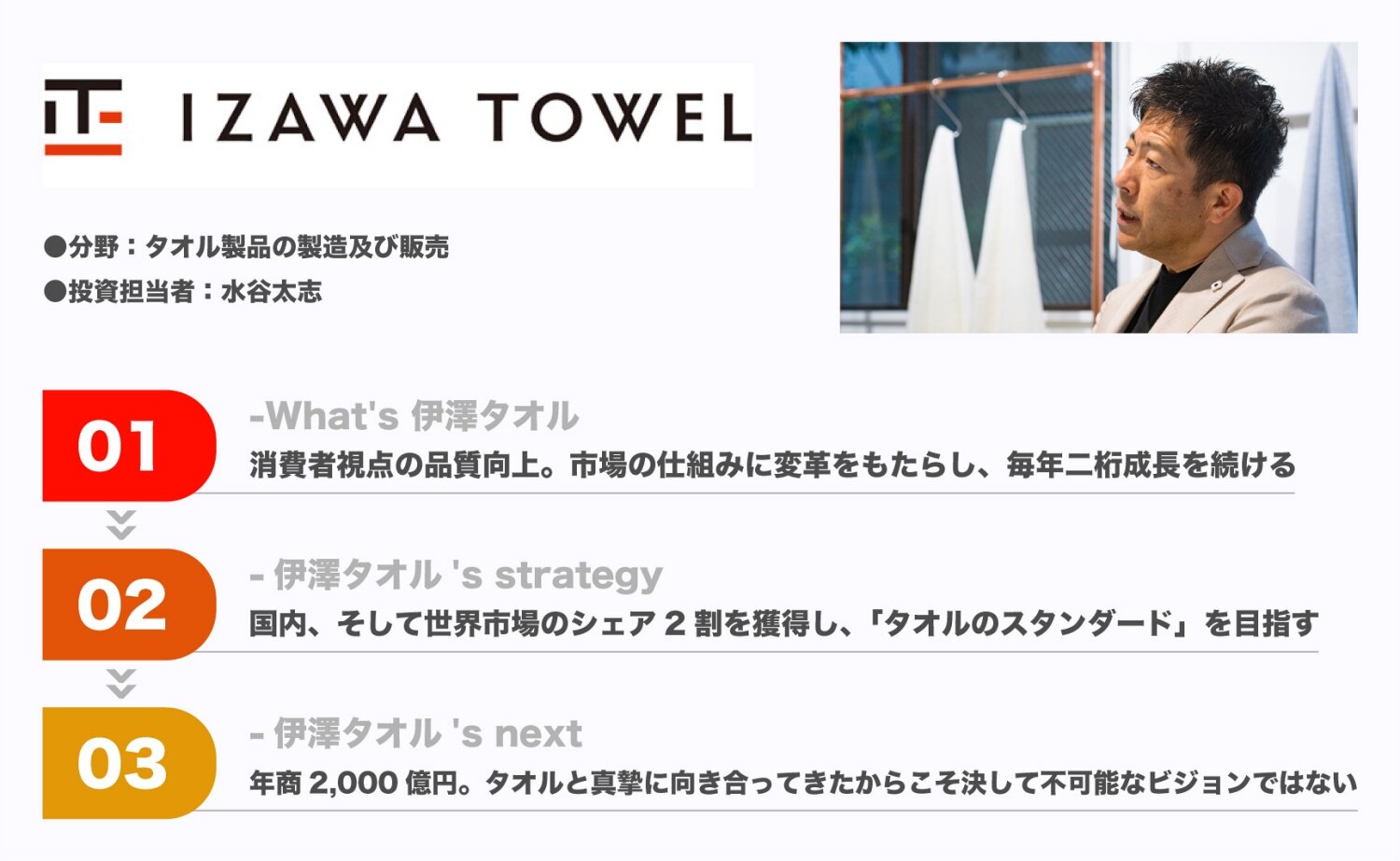
【Profile】
Shoji Izawa, President, Izawa Towel Co., Ltd.
After working for an apparel company, Shoji Izawa joined Izawa Towel in 1989. After the founder, Masami Izawa, passed away at a young age, he took over the company as the second-generation President in 1997 at the age of 33. He has continued to revolutionize the towel industry by introducing new ideas one after another. Together with the management team, he has led Izawa Towel to become one of the top companies in the industry.
【About Izawa Towel】
Izawa Towel's mission is to establish a global standard for towels, ensuring that consumers always have a trusted source for high-quality towels, by consistently prioritizing the useability and comfort of towels as an essential everyday product. In addition to designing and selling towel products to retailers, the company has also launched an e-commerce brand called Towel Laboratory on Amazon, and has achieved rapid growth while capturing a leading position in Amazon's towel market. The company is the top runner in the domestic towel industry with approximately 10% of the market share, and a game-changing player in the towel industry.
Improving quality from a consumer perspective, reshaping the market structure, and sustaining double-digit growth
Izawa Towel is growing at a pace unmatched in the domestic towel industry. Please tell us about your current management situation.
Izawa Actual sales for the fiscal year ended February 2023 were 9.4 billion yen. We have achieved double-digit growth in sales for 10 consecutive years. Sales for the most recent 12 months exceeded 10 billion yen, making us one of the largest in the industry in terms of operating income and volume handled. We expect continued double-digit level growth in the future.
The organization is expanding along with the business, and the number of employees has increased by approximately 1.5 times compared to five years ago. Since we are actively hiring new graduates, many from the younger generation who will lead the company in the future are active in the company, with 35% of our employees being in their 20s and 26% in their 30s.
What do you think is the reason for the remarkable growth in the already well-established towel industry?
Izawa Since the time of our founder, my father, we have focused on making towels as essential everyday products rather than gifts. In a well-established market, we pursue quality in terms of absorbency, durability, ability to dry quickly, and feel, and we are thoroughly attuned to the needs of consumers. I have inherited this management approach and have worked to improve quality by setting up our own laboratory and conducting joint research with universities. This has undoubtedly been the foundation of our growth.
Through many years of ODM work for major convenience stores and mass retailers, we have developed the ability to create the best possible products within the regulations set by each retailer and the ability to identify products that will sell well. These capabilities have allowed us to not only manufacture high-quality products but also present exceptionally precise plans to retailers. In addition, we have started an e-commerce brand called Towel Laboratory in response to a request from Amazon, which appreciated our expertise in this area. The towel series, which fully utilizes our accumulated know-how, has been very well received, and since sales started on Amazon, we have established the top share in the domestic EC market and are leading the expansion of the EC market for towels.
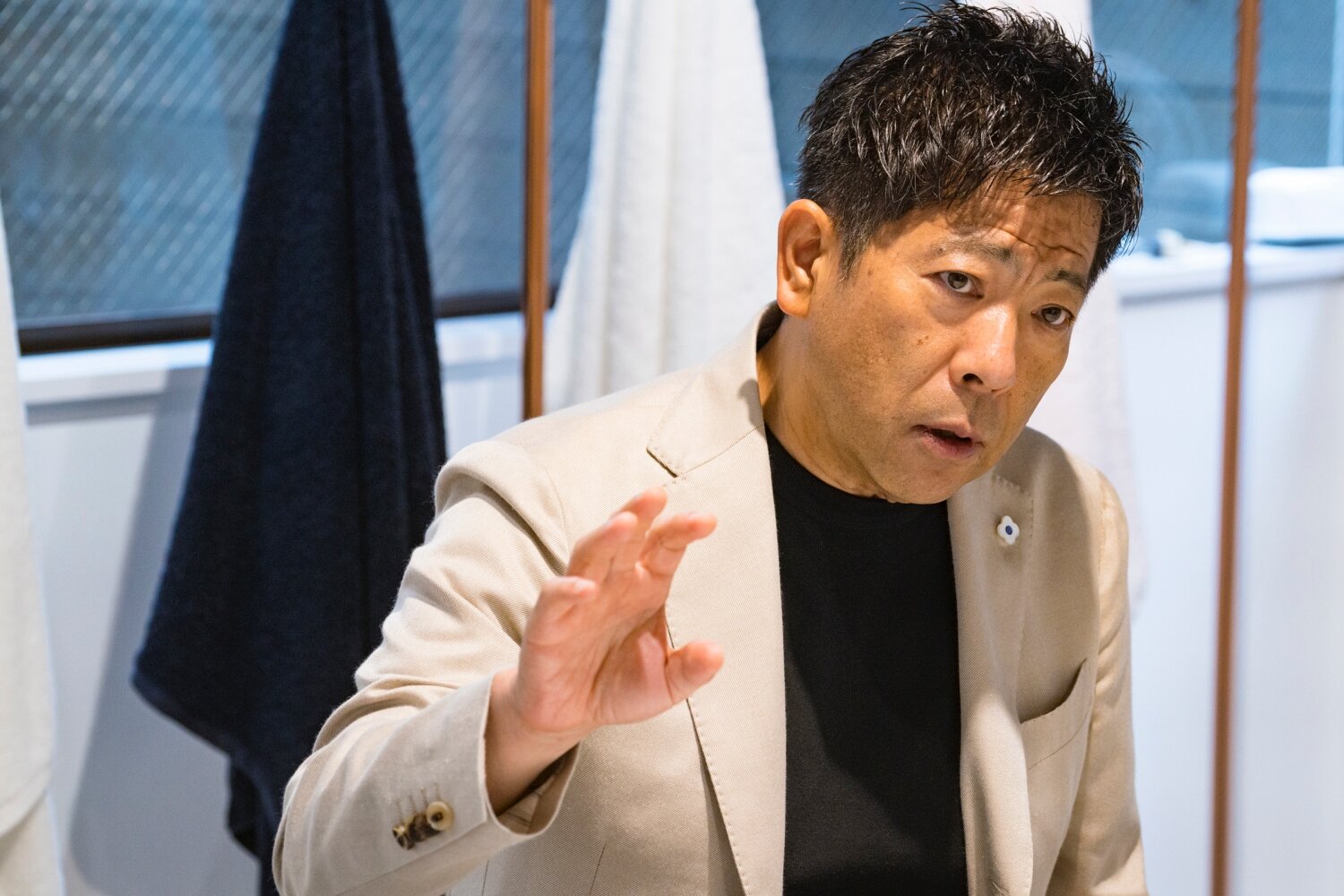
I understand that the quality your company offers which is tailored to consumers' preference has led to increased business with retailers and the huge success of Towel Laboratory. What did you do to improve quality?
Izawa We started by reviewing the raw materials. High-grade cotton used for clothing is not necessarily suitable for towels. That is why we collaborated with professors at national universities to study the performance of each raw material and compile data. Fibers are "plants," so there are naturally differences in development. Taking all of these factors into consideration, we established detailed manufacturing methods, for example, blending particular materials and spinning them a certain way to increase water absorbency, as well as a system for outsourcing manufacturing to factories.
Qualities such as absorbency, durability, and softness are in a trade-off relationship, where enhancing one characteristic can lead to a compromise in another. Therefore, it is extremely difficult to improve multiple functions at the same time. However, we have the know-how to do so, as we thoroughly understand towel production starting from raw materials.
I think such quality improvement leads to growth. How did you solve the problem of innovation in the well-established towel market that is difficult to change?
Izawa There are a great many towel companies in Japan, each of which is small in scale but has its own defined responsibility. Thinking that as long as it supplied its specialty product to a specialty market its business would be safe and sound, each company believed that the specifications for towels established long ago represented the final product.
In recent years, there has been a move toward direct transactions between the factories that manufacture the towels and the retailers who place the orders. What's happened is that only towels that retailers want to make and that the factories are able to make are produced, leaving consumers farther and farther behind. Feeling a deep sense of indignation, I decided to seriously reform the towel industry.
Izawa Towel became a platform to create a market where consumers can acquire quality towels at a reasonable price. This would lead to profits and an increase in the number of supporters. It was necessary to create such a cycle and overturn the conventions of the market.
Also, although towels are something that everyone uses every day, there is no product that can be deemed a true standard. For example, in the case of laundry detergent, there are several standard products that you could purchase and be sure about the quality. Consumers can choose their favorite product or a slightly higher grade product by using the standard products as a reference.
But in the case of towels, the features are too dispersed among towel companies, and there is no standard either in price or quality. Because of this lack of criteria for selection, it is not uncommon for people to spend their entire lives trying to find the towel of their choice. Our company is determined to change this situation and establish a standard for towels. That is the challenge we continue to take on every day.
Aiming to capture a 20% share of the domestic and global market and establish the standard for towels
What are the primary goals you need to achieve in order to establish a standard for towels?
Izawa Our first goal is to go public. We have already chosen a securities firm and an auditing firm, and preparations are underway for an IPO. We would also like to capture 20% of the domestic market share on a wholesale price basis by 2025. The size of the Japanese towel market is said to be around 75-100 billion yen on a wholesale price basis, and 20% would be an achievable level in light of our future sales projections.
However, we do not intend to expand our market share to 100%, because we believe that a state in which consumers have a wide range of choices is an important key to efforts and competition within the industry and to boosting the market as a whole. Our goal of going public and achieving a 20% share of the global market is a means to further increase our credibility and name recognition and to establish a standard for towels so that consumers do not have to worry when making purchases. We have no desire to monopolize the industry.
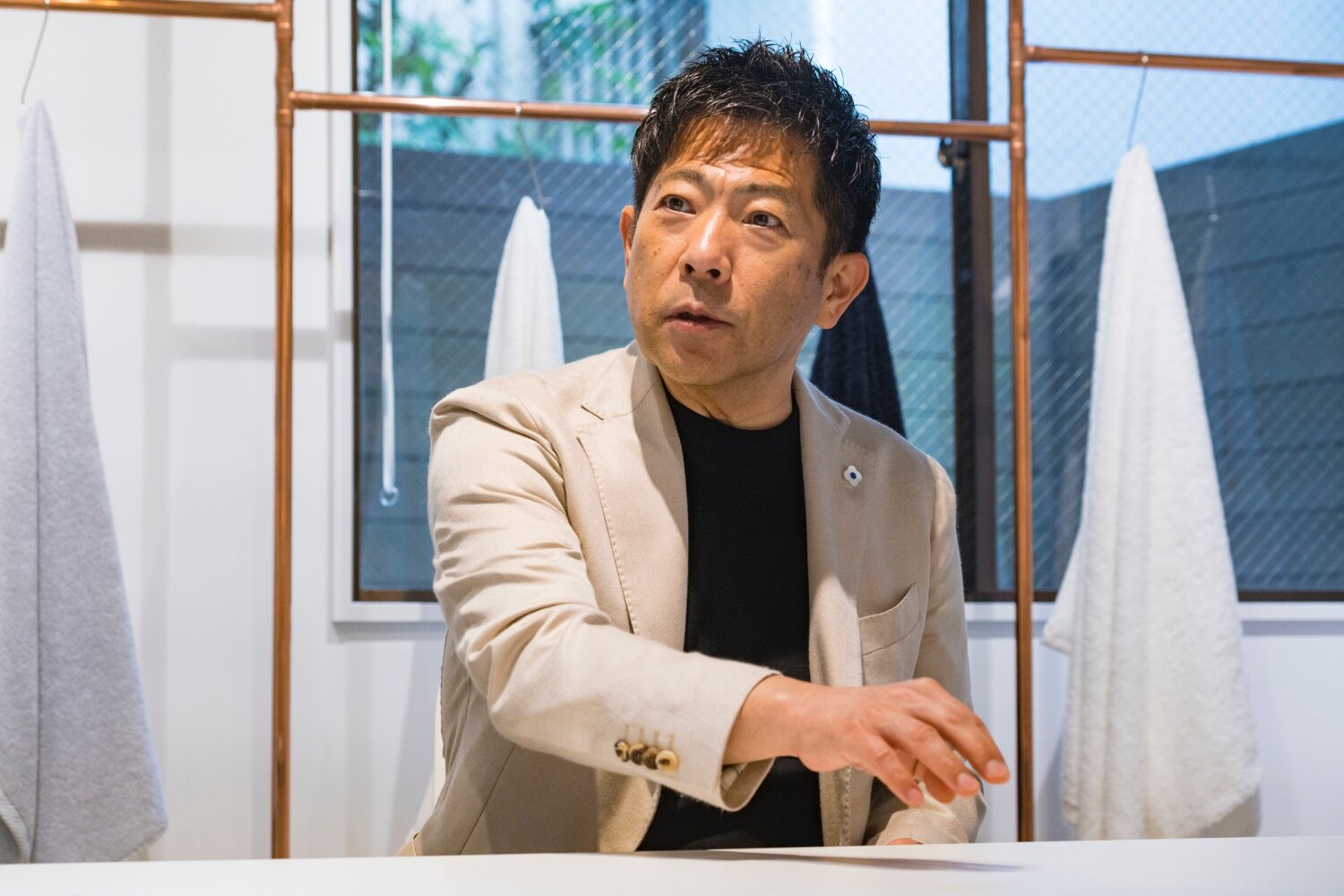
I understand that you're looking from the consumer's point of view in your decision to limit market share to 20% in consideration of the market. What is your vision for global expansion?
Izawa Excluding China, whose market is unclear, the U.S. ranks first in global towel consumption, followed by Japan and Germany, and then the U.K. and France. Interestingly, this is almost in tandem with the GDP ranking. Japan's GDP accounts for about 10% of the world's GDP, so if the Japanese towel market is worth 100 billion yen, the global market is roughly 1 trillion yen. Our next goal is to reach 20% of that amount, or 200 billion yen.
Towels in Europe and the U.S. are heavier than those in Japan and are more durable due to their culture of using dryers. On top of that, production efficiency and lot management are highly emphasized, so towels can be made at low prices. Japanese towels, on the other hand, are often made to be fluffy, soft, and easy to dry, and have strength in meticulous craftsmanship. In recent years, soft towels are growing in demand in Europe and the U.S., as weight and durability are in Japan as well, so I think that if we fuse the respective strengths of Western and Japanese towels, we can create a "global standard" towel that people all around the world would be eager to buy.
So it's not about exporting Japanese towels, but establishing a "global standard" with towels that have a new value.
Izawa Yes. To this end, after we go public, we would like to expand the scale of our business rapidly through aggressive capital alliances and M&As with leading European and U.S. competitors and others who agree with our approach. We are currently in the process of making field trips and negotiating with agents.
Even the larger towel companies in Europe and the U.S. have annual sales of about just 20 billion yen. Most have just several billion yen. On the other hand, towel manufacturing factories capable of producing towels on a global level can have annual sales of up to 80 billion yen. Because of this difference in scale, no matter how much we plan and design towels to global standards, our vision will not be realized unless we can get the factories to produce them.
But if we can form a huge group through capital alliances or M&As to gain influence in the market, factories will be willing to listen. They would be open to introducing methods and equipment to make better towels. The great thing about global IT companies and manufacturers is that they have the ability to create a sense of urgency and innovation in each factory. We, too, believe it is important to build such relationships with factories around the world, and we have already strengthened good business relationships with overseas factories on our own.
Creating a standard product for people worldwide also involves considering the perspective of the SDGs. In your pursuit for sustainable towel production, are there any initiatives you are currently undertaking?
Izawa The challenge for the textile industry is the high volume of wastewater. When making towels, the process involves applying glue to the yarn and weaving it. Once the weaving is finished, the glue is removed with large amounts of warm water and detergent. This is a process that requires a great deal of water, energy, money, and time, so we have long felt that this was an issue.
Therefore, we developed a new yarn that does not require glue application. We are now participating in a project by the Ministry of Economy, Trade and Industry to mass-produce that machine in order to spread it around the world as a Japanese technology. We are convinced that if we can expand our global operations to include these new raw materials and manufacturing methods, we can bring about major innovations in the global towel industry.
Annual sales of 200 billion yen is by no means an impossible vision considering our dedicated involvement in the towel industry.
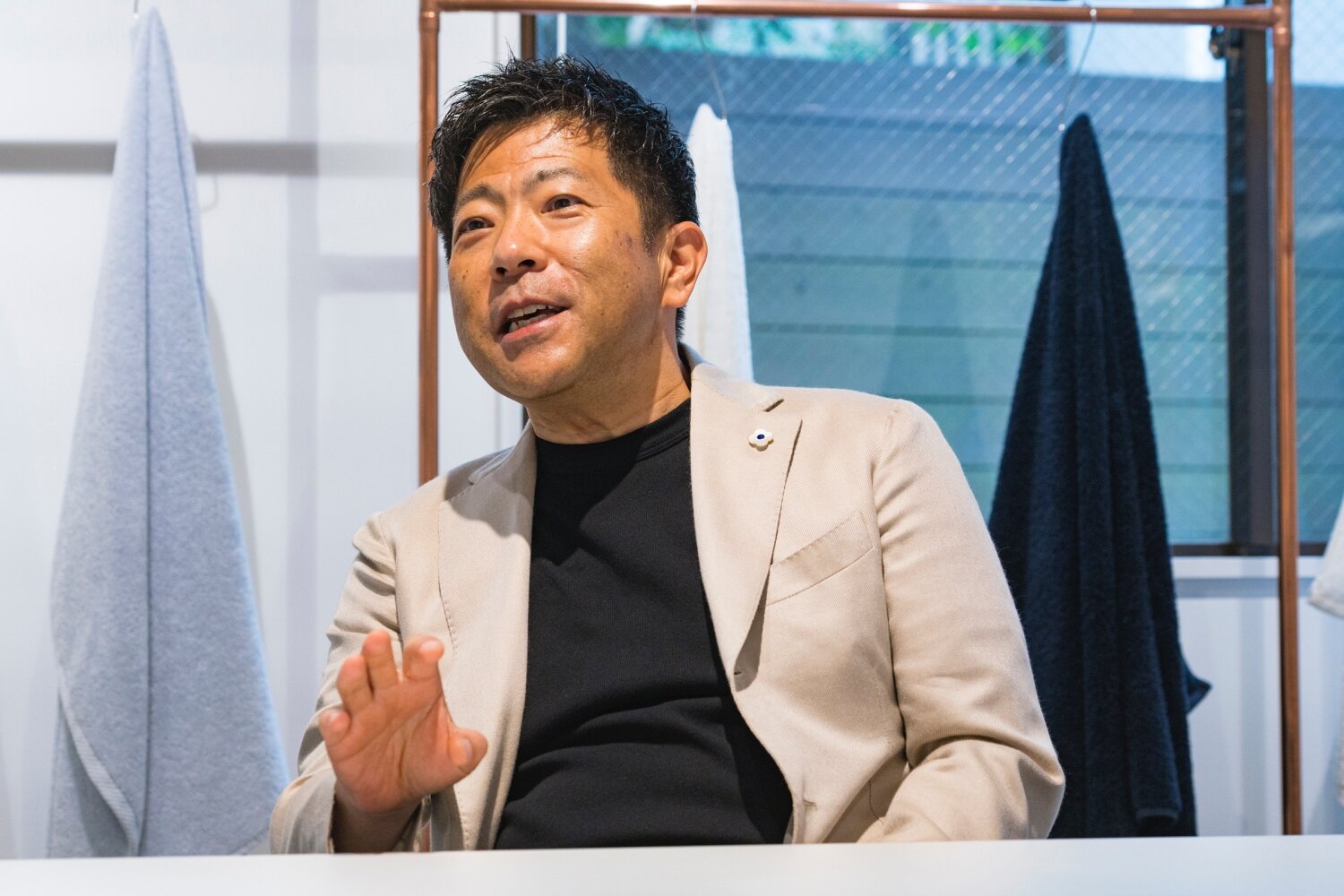
Being a second-generation leader in a mature industry, it might be tempting to simply inherit industry norms. Where did you develop this mindset?
Izawa When I took over this company at the age of 33, the industry was already established and I had a hard time finding what I should do and what only I could do. I honestly felt that I could not have confidence in myself, and there were times when I thought about quitting. However, a crisis of management gave me several opportunities to take an objective look at the industry and my company, and I began to have more questions. From there, I realized that my father had left me with an opportunity, and I thought, "Since he worked so hard to hand down this business, I should do my best to take it as far as I can."
It is said that about 70% of Japan's business population works for small and medium-sized enterprises (SMEs), and in recent years, the problem of business succession in SMEs has become increasingly serious. By having a company like ours go public, SME business owners may be inspired to think that maybe they can do it too, and their children, who had no intention of succeeding them, may take this opportunity to become interested in business succession. With more companies making the effort, not only will we preserve more workplaces, but we'll also see the growth of Japanese companies that can compete on a global scale. As a business leader, I would be happy if our company's challenge can be a catalyst for such a development.
When I think back to those days when I didn't know what to do and felt lost, the current challenge is not burdensome at all.
When I tell people about our vision of becoming a towel company with annual sales of 200 billion yen, they are very surprised and think that it's an ambitious goal. But am I talking about anything other than towels? We're not expanding into a wide range of products or starting new businesses. We are simply taking on a realistic challenge within the framework of towels, which we've worked so hard to develop. So I don't think we have an impossible vision, and I believe our employees feel the same.
What do you expect from the employees who will lead Izawa Towel in the future?
Izawa I believe that our company will become increasingly multinational in the future. It will become commonplace for people to be transferred to overseas partner companies, for overseas members to come to Japan, and for everyone to cooperate with each other regardless of nationality. At that time, ideas such as Japanese people being shy or not being good at sales will not work. While Japanese craftsmanship is renowned for its attention to detail, there are often cases where this excellence doesn't necessarily translate into sales. However, at Izawa Towel, I want our employees to acquire the skills to compete on a global scale.
I envision a future where towels bearing the name 'IZAWA' are used all over the world--A future where people from around the globe will associate towels with Japanese companies. I hope our team is determined to be the driving force behind making that future a reality. So, I encourage everyone to challenge themselves wholeheartedly.
Person in charge: Comment from Taishi Mizutani

Two years have passed since our investment. The past two years have been turbulent for the towel industry, with major changes in the macro environment surrounding the industry such as higher raw material prices, rising logistics costs, and the sharp depreciation of the yen. While other companies were trying to secure profits in the midst of these unpredictable changes, Izawa Towel has remained true to its original mission of "consumer-oriented management."
While it had a strong contrarian mindset and a solid sense of pride that Izawa Towel is able to grow rapidly when the industry undergoes major changes, behind the scenes, it prepared for various cases in advance based on precise calculations and responded to each change in the environment by preparing for the fluctuations.
I believe that success can be attributed to the combination of three key elements. Firstly, President Izawa consistently envisioned a clear vision. Secondly, the management team distilled this vision into simple yet effective strategies and tactics. And finally, the dedicated employees executed these strategies wholeheartedly.

